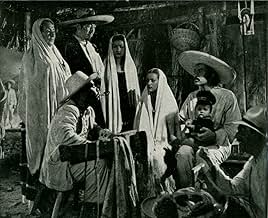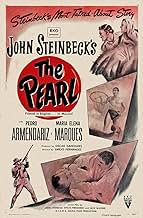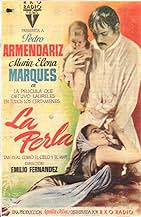IMDb RATING
7.4/10
1.2K
YOUR RATING
The discovery of a perfect pearl forever changes the lives of a poor Mexican fisherman and his family.The discovery of a perfect pearl forever changes the lives of a poor Mexican fisherman and his family.The discovery of a perfect pearl forever changes the lives of a poor Mexican fisherman and his family.
- Awards
- 9 wins & 6 nominations total
José Arratia
- Tratante de perlas
- (uncredited)
Guillermo Calles
- Indio rastreador
- (uncredited)
Enrique Cancino
- Pueblerino
- (uncredited)
Maria Elena Cuadros
- Juanita
- (uncredited)
Columba Domínguez
- Pueblerina
- (uncredited)
Enedina Díaz de León
- Yerbera
- (uncredited)
Agustín Fernández
- Pueblerino
- (uncredited)
Rogelio Fernández
- Pueblerino
- (uncredited)
Raquel García
- Pueblerina
- (uncredited)
Featured reviews
10whpratt1
Some how I over looked this John Steinbeck brief story years ago and loved this 1947 production and the fantastic acting. The film is great in black and white and it clearly shows the poverty of local fishermen and their hard tasks of having to dive only when the ocean was calm. Pedro Armendariz,"From Russia With Love",'63 and Maria Elena Marques,"Pueblilo",'62, gave an outstanding performance as husband and wife who have to deal with finding a great treasure and having to face the hard facts of many people who want to share their wealth. Charles Rooner,(Doctor),"Silent Fear",'56 plays a very horrible doctor who seems to hate the local fishermen and wants to treat only the rich who will be able to pay his medical fees. This is truly a great film, which was very well produced and a great Film Classic from the late 40's. Enjoy
This is a wonderfully shot film whose story, while not totally believable, could serve as allegory. Perhaps the family of the Mexican fisherman-diver played by Armendariz would have been happier if he had not discovered the pearl at all, but the poverty that endangers their baby's life makes his joy at this discovery (in a good underwater scene) credible. Immediately afterward, he finds himself beset by freeloaders and robbers (including his own brother), and the spiral continues until it ends in flight, hunger, death and a sort of redemption: the pearl is hurled back into the sea that spawned it. Apart from the story, the highlight is the Mexican scenery, the village and villagers, and the skillful and evocative camera angles. As one reviewer wrote, it's unlikely a villagers' celebration would have been as elaborate as the one shown in "La Perla," but it is enjoyable. Perhaps one semi-cynical message that could be gained from this film is that if you strike it rich, tell as few people as possible.
I am a Brit happily married to a Mexicana for many years and lived in Mexico for a number of years.
La Perla is a photographic masterpiece of significant beauty and well worth seeing for the magnificence of the incredible use of natural light to highlight the scenery.
In addition to the two main stars the cast contains a number of actors whose work I have enjoyed immensely and the scenes depicting the singing and dancing at the local fiesta bring back to me countless memories of pleasure during my life in that beautiful country.
This film really does reflect the Golden Years of the Mexican Fim Industry.
La Perla is a photographic masterpiece of significant beauty and well worth seeing for the magnificence of the incredible use of natural light to highlight the scenery.
In addition to the two main stars the cast contains a number of actors whose work I have enjoyed immensely and the scenes depicting the singing and dancing at the local fiesta bring back to me countless memories of pleasure during my life in that beautiful country.
This film really does reflect the Golden Years of the Mexican Fim Industry.
Adaptation of John Steinbeck's "The Pearl". I had to read the short novel in junior high. I found it bleak and depressing but powerful. I never even knew there was a film of this until TCM showed it tonight. I was very impressed.
It's a Mexican film and the story was changed to fit into that environment. I never even knew Mexico had a film industry back in the 1940s--films like this are never shown. That's a shame because this film was great. The acting was just OK but that's good--if it had been better acted this might have been unbearable. They didn't lighten up the book or change the ending like Hollywood would have done. And the direction and cinematography were just beautiful--this film should be seen just for the imagery alone. From the opening shot of the women in white robes standing silently by the sea the movie pulls you right in.
This is not for everyone. It's dark and depressing but just great. Despite the change of setting it retains all the power of the short novel. The only debit I could think of was the sometimes intrusive music score--some scenes would have worked much better silently. Still, well worth seeing. I give it an 8.
It's a Mexican film and the story was changed to fit into that environment. I never even knew Mexico had a film industry back in the 1940s--films like this are never shown. That's a shame because this film was great. The acting was just OK but that's good--if it had been better acted this might have been unbearable. They didn't lighten up the book or change the ending like Hollywood would have done. And the direction and cinematography were just beautiful--this film should be seen just for the imagery alone. From the opening shot of the women in white robes standing silently by the sea the movie pulls you right in.
This is not for everyone. It's dark and depressing but just great. Despite the change of setting it retains all the power of the short novel. The only debit I could think of was the sometimes intrusive music score--some scenes would have worked much better silently. Still, well worth seeing. I give it an 8.
Apparently this piece is uncomfortable for people who simplify into moralism its complexity and forcefulness in what it has to say both explicitly and implicitly, aspirationism for wealth and the discord and greed it provokes, bourgeois class robbery of the working class, colonialist extractionism, whiteness as a jewel that gives privilege, all this as true then as it still is, set in a melodrama full of anguish, plus of course a beautiful montage in which the photography and the masterful underwater sequences stand out, marvellous at the time and which stand the test of time with great neatness.
Did you know
- TriviaEmilio Fernández, who was in love with Olivia de Havilland, thought she was the ideal actress to play the female starring role. De Havilland never knew of his secret love, but the director was able to get the government of Mexico City to change the name of the street he grew up on to "Dulce Olivia" (Sweet Olivia).
- Quotes
Narrator: This is a story that old men tell to children. They aren't sure where it happened or when.
- Alternate versionsA short version (77') was shown in the USA, France and West Germany whereas a longer version (85 to 87') was shown in Mexico and East Germany.
- ConnectionsAlternate-language version of The Pearl (1948)
- How long is The Pearl?Powered by Alexa
Details
- Runtime
- 1h 25m(85 min)
- Color
- Aspect ratio
- 1.37 : 1
Contribute to this page
Suggest an edit or add missing content



























